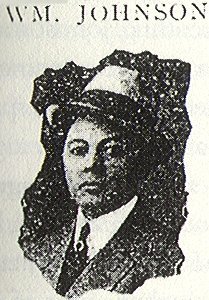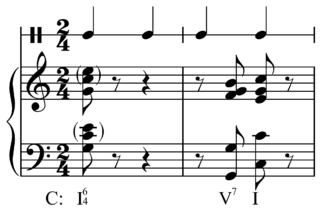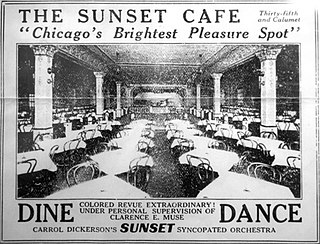Related Research Articles

William Manuel "Bill" Johnson was an American jazz musician who played banjo and double bass; he is considered the father of the "slap" style of double bass playing.

Edward "Kid" Ory was an American jazz composer, trombonist and bandleader. One of the early users of the glissando technique, he helped establish it as a central element of New Orleans jazz.
"Potato Head Blues" is a Louis Armstrong composition regarded as one of his finest recordings. It was made by Louis Armstrong and his Hot Seven for Okeh Records in Chicago, Illinois on May 10, 1927. It was recorded during a remarkably productive week in which Armstrong's usual Hot Five was temporarily expanded to seven players by the addition of tuba and drums. Some scholars have suggested that a key melodic figure in "Potato Head Blues" was picked up by Hoagy Carmichael for "Stardust." Its musical composition entered the public domain on January 1, 2023.
The Hot Five was Louis Armstrong's first jazz recording band led under his own name.
Louis Armstrong and his Hot Seven was a jazz studio group organized to make a series of recordings for Okeh Records in Chicago, Illinois, in May 1927. Some of the personnel also recorded with Louis Armstrong and His Hot Five, including Johnny Dodds (clarinet), Lil Armstrong (piano), and Johnny St. Cyr. These musicians were augmented by Dodds's brother, Baby Dodds (drums), Pete Briggs (tuba), and John Thomas. Briggs and Thomas were at the time working with Armstrong's performing group, the Sunset Stompers.
"West End Blues" is a multi-strain twelve-bar blues composition by Joe "King" Oliver. It is most commonly performed as an instrumental, although it has lyrics added by Clarence Williams.

In tap dancing, jazz, and blues, stop-time is an accompaniment pattern interrupting, or stopping, the normal time and featuring regular accented attacks on the first beat of each or every other measure, alternating with silence or instrumental solos. Stop-time occasionally appears in ragtime music. The characteristics of stop-time are heavy accents, frequent rests, and a stereotyped cadential pattern. Stop-timing may create the impression that the tempo has changed, though it has not, as the soloist continues without accompaniment. Stop-time is common in African-American popular music including R&B, soul music, and led to the development of the break in hip hop.
I'll Be Glad When You're Dead You Rascal You is a 1932 American pre-Code Fleischer Studios animated short film starring Betty Boop, and featuring Koko the Clown and Bimbo. The cartoon features music by and a special guest appearance from jazz trumpeter Louis Armstrong and his Orchestra playing "You Rascal You". The title of the film comes from the song, written by Sam Theard in 1931.
"Blue Yodel #9" is a blues-country song by Jimmie Rodgers and is the ninth of his "Blue Yodels". Rodgers recorded the song on July 16, 1930 in Los Angeles with an unbilled Louis Armstrong on trumpet and his wife Lil Hardin Armstrong on piano. Armstrong and Hardin were not listed on this session due to Armstrong's contract with Okeh; this session was for Victor. According to Thomas Brothers, the irregular blues form along with the irregular phrases used by Rodgers frequently threw off Armstrong until he reached his own solo chorus, where he sticks to a regular 12 bar blues form.
Carroll Dickerson was a Chicago and New York–based dixieland jazz violinist and bandleader, probably better known for his extensive work with Louis Armstrong and Earl Hines or his more brief work touring with King Oliver.

The Sunset Cafe, also known as The Grand Terrace Cafe, was a jazz club in Chicago, Illinois operating during the 1920s, 1930s and 1940s. It was one of the most important jazz clubs in America, especially during the period between 1917 and 1928 when Chicago became a creative capital of jazz innovation and again during the emergence of bebop in the early 1940s. From its inception, the club was a rarity as a haven from segregation, since the Sunset Cafe was an integrated or "Black and Tan" club where African Americans, along with other ethnicities, could mingle freely with white Americans without much fear of reprisal. Many important musicians developed their careers at the Sunset/Grand Terrace Cafe.
James Preston McDonald, better known by his stage name Preston Jackson was an American jazz trombonist.

"Heebie Jeebies" is a composition written by Boyd Atkins which achieved fame when it was recorded by Louis Armstrong in 1926. Armstrong also performed "Heebie Jeebies" as a number at the Vendome Theatre. The recording on Okeh Records by Louis Armstrong and his Hot Five includes a famous example of scat singing by Armstrong. After the success of the recording, an accompanying dance was choreographed and advertised by Okeh.
"(What Did I Do to Be So) Black and Blue" is a 1929 jazz standard composed by Fats Waller with lyrics by Harry Brooks and Andy Razaf. It was introduced in the Broadway musical Hot Chocolates (1929) by Edith Wilson. In the show, Wilson originally sang the song from a bed with white sheets, but the bed was removed after the first show due to the judgement that it was too suggestive. The show also included Waller's hit compositions "Ain't Misbehavin'" and "Honeysuckle Rose".
"Big Butter and Egg Man" is a 1926 jazz song written by Percy Venable. Venable was a record producer at the Sunset Cafe and wrote the song for Louis Armstrong and singer May Alix. The song is often played by Dixieland bands, and is considered a jazz standard.
Joe "Fox" Smith was an American jazz trumpeter.
"You Rascal You" is an American song written by Sam Theard in 1929, and legally titled "I'll Be Glad When You're Dead." The lyrics take the form of threats and complaints leveled against a man who has repaid the singer's hospitality and kindness by running off with the singer's wife.
"Dippermouth Blues" is a song first recorded by King Oliver's Creole Jazz Band for Gennett Records in April 1923 and for Okeh Records in June of that same year. It is most often attributed to Joe "King" Oliver, though some have argued that Louis Armstrong was in fact the composer. This is partly because "Dippermouth", in the song's title, was a nickname of Armstrong's. Also, the phonograph recordings from 1922 gave credit to Armstrong and Oliver jointly. The song is a strong example of the influence of the blues on early jazz. There is a twelve-bar blues harmonic progression, with frequent bent notes and slides into notes.
Ollie Powers was an American jazz drummer and vocalist.
Hot Chocolates is a musical revue with music by Fats Waller and Harry Brooks and book by Andy Razaf. It was originally titled Tan Town Topics in hopes it would be picked up by Broadway. Performed at the Hudson Theater in New York City, it was directed by Leonard Harper and ran for 219 performances from June 20, 1929, to December 14, 1929. It is also referred to as Connie's Hot Chocolates. It was staged, directed and produced by Leonard Harper. While the revue featured music and singing, including the subsequent hit "Aint Misbehavin'," it was praised for the cast's dancing, including its male and female chorus lines.
References
- 1 2 Bracks, Lean'tin L.; Smith, Jessie Carney (2014). Black Women of the Harlem Renaissance Era. Rowman & Littlefield. p. 2. ISBN 978-0-8108-8543-1.
- ↑ Brothers, Thomas (2014). Louis Armstrong: Master of Modernism. New York, NY: W.W. Norton & Company. p. 74. ISBN 978-0-393-06582-4.
- 1 2 Brothers, Thomas (2014). Louis Armstrong: Master of Modernism. New York, NY: W.W. Norton & Company. p. 246. ISBN 978-0-393-06582-4.
- 1 2 Chadbourne, Eugene. "May Alix". AllMusic .